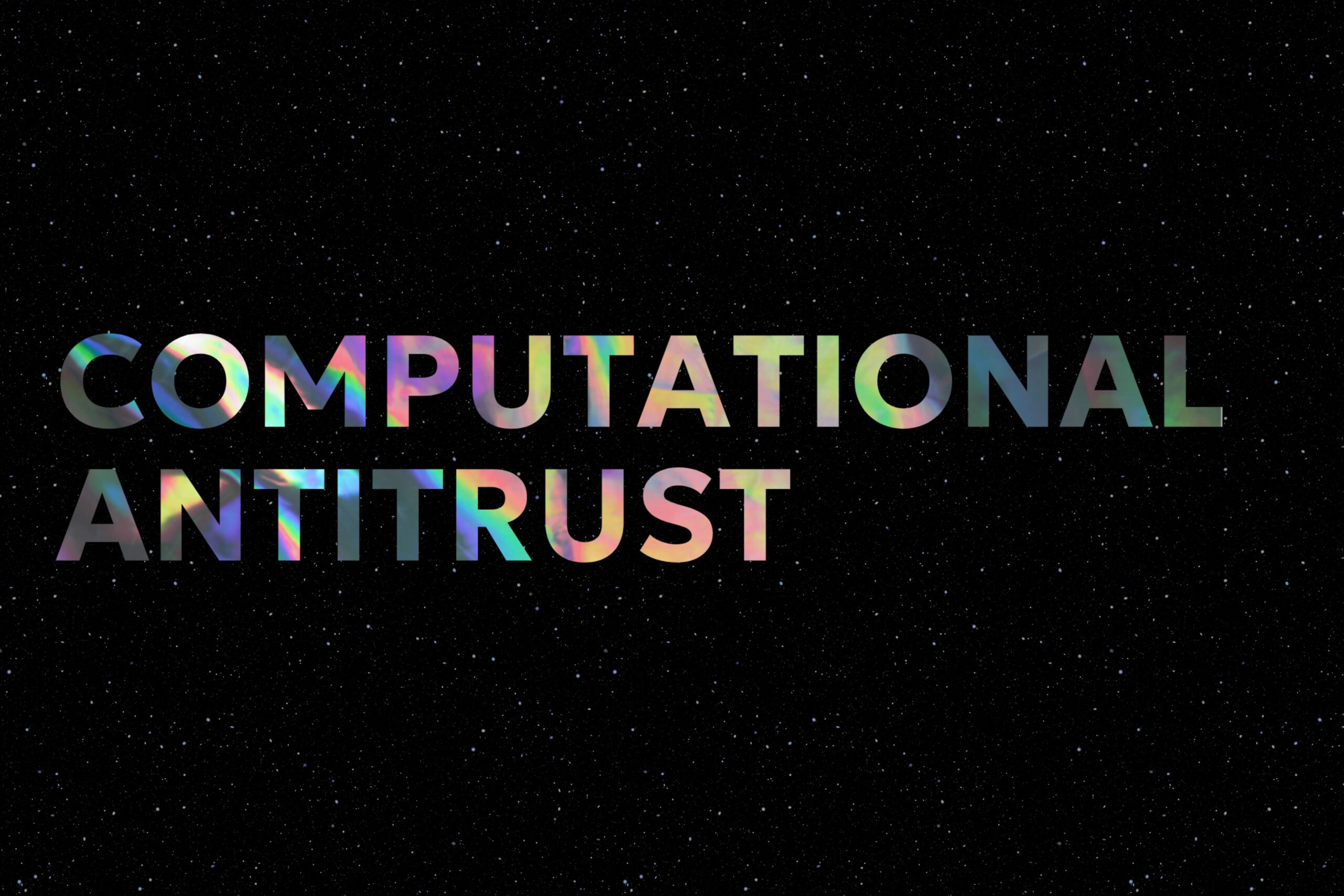The Network Law Review is pleased to present you with a Dynamic Competition Initiative (“DCI”) symposium. Co-sponsored by UC Berkeley, EUI, and Vrije Universiteit Amsterdam’s ALTI, the DCI seeks to develop and advance innovation-based dynamic competition theories, tools, and policy processes adapted to the nature and pace of innovation in the 21st century. The symposium features guest speakers and panelists from DCI’s first annual conference held in April 2023. This contribution is signed by Ana Malheiro, Case Handler Officer at the European Commission in the Digital Markets Act Task Force.
***
1. Introduction
Sometimes, to understand where we are, we must first understand where we came from. The Digital Markets Act (“DMA”)1Regulation (EU) 2022/1925 of the European Parliament and of the Council of 14 September 2022 on contestable and fair markets in the digital sector and amending Directives (EU) 2019/1937 and (EU) 2020/1828, OJ L 265, 12.10.2022, p.1-66. is the outcome of a long reflection process that was informed by the Commission’s own antitrust enforcement experience, as well as by the realisation that some issues related to features of the digital economy were of a systemic nature and could not be resolved through competition law alone.2See Commission Impact Assessment Report accompanying the document Proposal for a Regulation of the European Parliament and pf the Council on contestable and fair markets in the digital sector (Digital Markets Act), SWD (2020) 363 final, 15.12.2020.
Twenty years ago, the digital economy was still in its infancy.3Despite the early enthusiasm with the internet that led to the dot-com bubble burst in March 2000. Online service providers in Europe struggled with a fragmented legal framework and the uncertainty as to whether they could be liable for hosting third-party content online. This uncertainty led to the adoption of a directive which is still today regarded as the cornerstone of the digital single market: the eCommerce Directive.4The eCommerce Directive established the country-of-origin principle which ensures the freedom to provide online services across the Single Market. It also established the principle that online intermediaries are not liable for third-party content, provided some conditions are met, similarly to Section 230 of the Communications Decency Act in the USA. See Directive 2000/31/EC, of the European Parliament and of the Council of 8 June 2000 on certain legal aspects of information society services, in particular electronic commerce, in the Internal Market, OJ L 178, 17.7.2000, p.1-16. Since it was adopted in 2000, the digital economy has changed profoundly, with the development of new services at an unprecedented rate and scale.
As markets changed, regulators and enforcement agencies became increasingly busy with cases that raised completely new challenges, not just in Europe but across the globe. Antitrust enforcement became more challenging and very soon enforcers, business users and civil society started sounding the alarm that a handful of companies in the digital sector were unilaterally able to set the rules of the game on their respective platforms, often also allowing them to take over services adjacent to their core services. End-users were being deprived of the ability to choose, business users had little or no bargaining power, and competition law alone was insufficient to address the new challenges posed by a data-driven sector characterized by extreme returns on scale and network effects.5See also Jacques Crémer, Yves-Alexandre de Montjoye and Heike Schweitzer, Competition Policy for the Digital Era (European Commission 2019).
Several studies have been conducted across the globe to understand the root causes for this tendency of digital markets to move towards extreme levels of concentration and to be prone to “tipping”, i.e., to reach a point where one company emerges as a winner and competition can no longer take place. Different yet similar concepts were developed to capture the influence of specific companies in the digital sector, such the “strategic market status,”6Furman, J. et al. (2019), Unlocking digital competition. Report of the Digital Competition Expert Panel, HM Treasury. “significant and durable market power,”7US House of Representatives Majority Staff Report, Investigation of Competition in Digital Markets, October 2020. “substantial market power”8Australian ACCC report, Digital Platforms Inquiry, Final Report, June 2019. or “bottleneck power.”9Stigler Center report, Committee for the Study of Digital Platforms Market Structure and Antitrust Subcommittee Report, July 2019. Other reports addressing the topic were issued by the US House of Representatives Sub-Committee on Antitrust (2020), Investigation of competition in digital markets and the United States Federal Trade Commission’s Hearings on Competition and Consumer Protection in the 21st Century. They all point, fundamentally, to the same conclusion: antitrust needs to be complemented by some sort of ex ante regulation. This is how we arrived at the adoption of the Digital Markets Act by the European co-legislators in September 2022.
2. Legal nature
The Digital Markets Act was adopted as a regulation under Article 114 of the Treaty on the Functioning of the European Union (TFEU), which enables the Commission to adopt measures for the approximation of laws in the Member States which have as their objective the establishment and functioning of the internal market. The DMA is binding in its entirety and is directly applicable in all Member States. In addition, the DMA creates rights and obligations for individuals (companies and citizens) that can be enforced directly before national courts.
The DMA is a new type of ex ante regulation that builds on the Commission’s competition and regulatory enforcement experience. However, in contrast to competition law and to existing sectoral legislation, the DMA harmonises at EU level the rules that undertakings with a “gatekeeper” status need to comply with as providers of the services listed in the Regulation, irrespective of the actual, potential or presumed effects of the gatekeepers’ conduct. Unlike under competition law, the Commission is not required to conduct a case-by-case assessment of the effects of gatekeepers’ conduct. Rather, the practices prohibited under the Regulation are considered harmful per se by the co-legislator and therefore illegal, with only very few and narrow exceptions.
3. Objectives
The purpose of the DMA is, first and foremost, to contribute to the proper functioning of the internal market by enhancing coherence and legal certainty and reducing the costs associated with market fragmentation (including on innovation), through a harmonized set of rules across the Union.
At the same time, the DMA aims to ensure that markets in which gatekeepers operate are contestable and fair.10Article 1(1) DMA. These concepts are not alien to competition law, but they are wider in scope. Contestability relates to the “ability of undertakings to effectively overcome barriers to entry and expansion and challenge the gatekeeper on the merits of their products and services.”11Recital (32) DMA. Fairness relates to an “imbalance between the rights and obligations of business users where the gatekeeper obtains a disproportionate advantage”.12Recital (33) DMA. As recognized by the DMA, both objectives are intertwined, and obligations often address both.
The objectives of the DMA are complementary to that of competition law, which is to protect undistorted competition in specific markets.13Recital (11) DMA. As a result, the DMA is without prejudice to the application of Articles 101 and 102 TFEU or their national equivalents, as well as the rules on merger control. The DMA is also without prejudice to so-called ‘stricter national law’ concerning unilateral conduct, insofar as such laws apply to undertakings other than gatekeepers or impose further obligations on gatekeepers that go beyond the obligations under the DMA.14Article 1(6) DMA.
4. Scope of application
The DMA is limited in scope: it is intended only to apply to the economically most significant digital platform providers (so-called “gatekeepers”) in relation to a closed list of services (“core platform services”).15The following core platform services are identified in Article 2(2) DMA: online intermediation services, online search engines, online social networking services, video-sharing platform services, number-independent interpersonal communication services operating systems, web browsers, virtual assistants, cloud computing services and online advertisement services. The DMA gives the Commission the authority to designate undertakings as gatekeepers.16Article 3(4) DMA. The Commission will designate an undertaking as a gatekeeper if the undertaking fulfils three cumulative conditions:
- First, the undertaking must have a significant impact on the internal market. This is presumed to be the case where the annual turnover of the undertaking in the EU was at least EUR 7.5 billion in each of the last three financial years, or where its average market capitalization or its equivalent fair market value was at least EUR 75 billion in the last financial year.17And it provides the same core platform service in at least three Member States. See Articles 3(1) (a) and 3(2) (a) DMA.
- Second, the undertaking must provide a core platform service that serves as an important gateway for business users to reach end users. This is presumed to be the case where the undertaking provides a core platform service that, in the last financial year, had at least 45 million monthly active end users established or located in the EU, and that had at least 10,000 yearly active business users established in the EU.18Articles 3(1) (b) and 3(2) (b) DMA.
- Finally, the gatekeeper must enjoy an “entrenched and durable position”, or it must be foreseeable that it will acquire such a position in the near future. This shall be presumed to be the case if the gatekeeper has reached the above-mentioned user numbers in each of the last three financial years.19Articles 3(1) (c) and 3(2) (c) DMA.
Undertakings that reach the presumption thresholds referred to in Article 3 must notify the Commission.20Article 3(3) DMA. The Commission will examine the information in the notification and then adopt a decision designating the relevant undertaking as gatekeeper for the purpose of the DMA.21Article 3(4) DMA.
Where undertakings do not satisfy the quantitative thresholds provided for in the Regulation,22Article 3(2) DMA. the Commission may nevertheless designate an undertaking providing core platform services as gatekeeper following a market investigation and considering the different elements of a qualitative nature set out in the DMA.23Article 3(8) DMA. The Commission may also designate undertakings providing core platform services that do not yet enjoy an entrenched and durable position, but which will foreseeably enjoy such a position in the near future (“emerging gatekeepers”). In these situations, however, only a limited set of obligations apply that are necessary and appropriate to prevent that the gatekeeper concerned achieves an entrenched and durable position in its operations.24Article 17(4) DMA.
5. Obligations, compliance and enforcement
Once an undertaking has been designated as a gatekeeper, it will have six months to comply with the obligations set out in Articles 5, 6 and 7 DMA.25Article 3(10) DMA. These obligations only apply with respect to the core platform services for which the undertaking was designated as a gatekeeper by the Commission. The obligations apply automatically, without the need for the Commission to take further implementing measures.
The Commission may further specify the measures that the gatekeeper concerned should adopt in order to effectively comply with the obligations set out in Articles 6 and 7, through the adoption of a specification decision following a dialogue with the gatekeeper concerned and after enabling third parties to make comments. The initiation of this dialogue is, however, at the discretion of the Commission. It does not suspend the obligation to comply with the provisions of the Regulation nor does it prevent the Commission from establishing non-compliance.
The DMA explicitly prohibits gatekeepers from trying to circumvent the DMA through contractual, commercial, technical, or other means26Article 13 DMA. and requires them to provide the Commission with a report describing in detail and in a transparent manner the measures it has implemented to ensure compliance with the obligations laid down in Articles 5, 6 and 7 DMA.27Article 11 DMA The DMA also requires gatekeepers to provide information about any intended concentration in the digital sector, irrespective of whether it is notifiable under EU or national merger control rules,28Article 14 DMA. and to provide the Commission with an independent audit of techniques for profiling consumers.29Article 15 DMA.
The Commission has exclusive competence to establish infringements and impose sanctions where gatekeepers breach their obligations under the DMA. To this end, the Commission has certain investigative powers which largely correspond to those under Regulation 1/2003. In addition, in case of repeated infringements, the Commission can impose on gatekeepers fines of up to 20% of their worldwide turnover in the preceding financial year.30Article 30(2) DMA. Crucially, the Commission may impose behavioral or structural remedies, including merger moratorium31i.e. the prohibition, during a limited period, for a gatekeeper to enter into a concentration within the meaning of Article 3 of Regulation (EC) No 139/2004 regarding the core platform services or the other services provided in the digital sector or enabling the collection of data that are affected by the systematic non-compliance. See Article 18(2) DMA. or structural separation in cases of systematic non-compliance by a designated gatekeeper.32Article 18 (1) DMA.
The DMA also provides for a comprehensive set of rules on the coordination and cooperation between the Commission and national authorities. In particular, the Commission and national competition authorities will coordinate their respective enforcement actions and have the power to exchange any kind of information. National competition authorities will also support the Commission’s enforcement actions under the DMA and have the possibility, if empowered under national law, to conduct investigations into potential non-compliance by gatekeepers with the DMA in their respective territories.
6. Challenges and opportunities
As a result of the DMA, by spring 2024 at the latest, the landscape for the provision of certain digital services (those we call the “core platform services”) in the European Union will be very different. It will be different not only for the undertakings that provide those services, but also for business users that depend on the services in order to be able to reach their own customers, and ultimately also for the end users that use, and benefit from, those services. By improving fairness and contestability and by setting clear rules at Union level, the DMA will also incentivize business users that depend on gatekeepers to innovate, thereby giving them a fair chance to grow.
Differently from antitrust rules, the DMA establishes the principle that it is incumbent on gatekeepers to demonstrate that they comply with the Regulation. Circumvention tactics are expressly forbidden.33Article 13 DMA. Systematic non-compliance is severely punished.34Article 18 DMA. As a result, gatekeepers will have a strong incentive to comply with the DMA and to cooperate in good faith with the Commission.
The DMA also brings with it the potential to set a “gold standard” in regulating the way specific digital services should be provided by the largest platforms, who currently have the power to open or close the gate on business users, and in doing so allow them to have greater scope to reach out to their end users.
7. Conclusion
The DMA is a one-of-a-kind regulation. It is novel and ambitious. It introduces a new form of regulation of digital markets which has no direct precedent in any other sector in the European Union, or anywhere else in the world. It has the potential to improve consumer choice and give business users a fair opportunity to innovate and grow. Like the eCommerce Directive of 20 years ago, it has the potential of making a positive change in the online economy as we know it today, to the benefit of both European citizens and the European economy.
Ana Malheiro35Ana Malheiro is an official at the European Commission, Directorate-General for Competition. This article reflects her personal views only and should not be considered as an official statement of the Commission or the Directorate-General for Competition.
| Citation: Ana Malheiro, “The EU Digital Markets Act: A One-of-a-kind Regulation”, Network Law Review, Summer 2023. |








